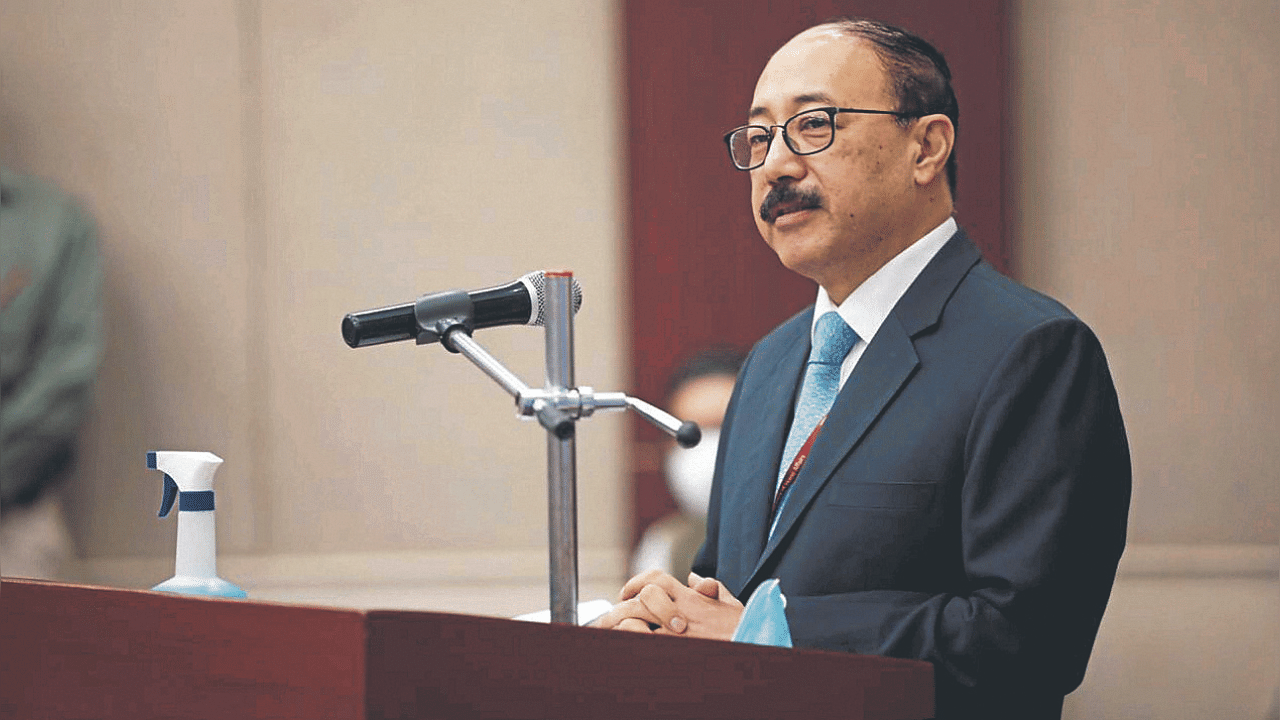
As the world appears to be coming to terms with living with Covid-19, India is actively engaging with other countries to facilitate the travel of students and professionals to their educational institutions and companies abroad, Foreign Secretary Harsh Vardhan Shringla said on Thursday.
While noting that the pandemic continues to rage worldwide and affects all aspects of lives, Shringla, in his remarks at the Kalinga Institute of Industrial Technology (KIIT), Bhubaneswar, talked about how diplomatic efforts contributed to the overall efforts of the government in dealing with Covid-19.
He said during the initial stage in January last year when there was a lockdown in China, special flights were undertaken to evacuate Indian nationals who were stuck in Wuhan.
Later, as many countries imposed lockdowns and international commercial travel came to a standstill, a lot of Indian citizens were stranded across the globe and the Ministry of External Affairs along with other ministries undertook the Vande Bharat Mission, which has been the largest and most complex exercise ever undertaken by the government for repatriation of Indian nationals, Shringla said.
In total, so far, more than 25 lakh people have been brought back, including over 11,000 people from Odisha, Shringla said at the formal inauguration of the Japanese language programme and internship for KIIT students.
"In addition, the (external affairs) ministry and our embassies abroad worked in tandem with other ministries of the government to secure provision of adequate supplies of PPE kits, testing kits etc. in India till our domestic production capacities were ramped up," he said.
Shringla noted that another aspect was the supply of medicines to deal with Covid-19 such as hydroxychloroquine to more than 150 countries in keeping with India's well-earned reputation of being the pharmacy of the world.
Earlier this year, under the Vaccine Maitri programme, India shared vaccines with 95 other countries and UN peacekeepers, he said.
Rapid response teams from India visited a number of countries "in our region to assist with expertise and capacity in dealing with the Covid crisis", he pointed out.
"These actions generated immense goodwill. The prime minister (Narendra Modi) referred to this as ‘human-centric globalisation’. As Prime Minister Narendra Modi said at the Global Covid-19 Summit recently, this goodwill generated was in evidence when the world stood with India as we were going through the second wave of Covid-19 earlier this year," Shringla said.
"The overwhelming solidarity we received from our partner countries was a consequence of our efforts to help others when they were in need," he said, adding that this support, in the form of items like oxygen generating plants, ventilators and oxygen concentrators, was distributed to a number of states.
Going forward, vaccination against Covid-19 will remain the main focus of governments across the world, he asserted.
"In this context too, India is playing its part. As you know, India is a global vaccine manufacturing hub. We are close to achieving the landmark of administering a billion vaccines to our citizens," Shringla said.
"You would have seen reports of the recent visit of the prime minister to the US and to the United Nations recently, including for the Summit Meeting of Quad leaders. A Quad is a group of four countries consisting of India, Japan, Australia and the US. At the Quad Leaders’ Summit, a decision was taken for the Quad to supply a billion vaccines to the Indo-Pacific region," he said.
The US and Japan will finance the supply of Indian made vaccines to these countries with Australia providing the last mile logistical support, Shringla said.
"You can see how these four countries have come together to pool in their strengths and emerge as a force for global good," he added.
Noting that the world now appears to be coming to terms with living with Covid-19, Shringla said, "We are actively engaging with other countries to facilitate the travel of students and professionals to their educational institutions and companies abroad."
"We have introduced a system of mutual recognition of vaccination certification so that vaccinated people do not face restrictions on travel. By the way, all of us do need passports to travel abroad. The Ministry of External Affairs has in the last few years taken a series of reform measures to ease the process for citizens in obtaining passports and today it is much easier and quicker to obtain passports," he said.
Asserting that India is a prominent global economy, Shringla said as it grows and develops, it will be beneficial for India too if its neighbours in South Asia see a stake in its growth and see their development linked with India's own growth.
Also Read | Searching for flights gets 'greener': Here's how
"We have to take them along so that when we develop, they too develop and the fruits of that are mutually shared," he asserted.
Therefore, the government under the leadership of Prime Minister Modi has planned a special emphasis on the comprehensive development of relations with our neighbours, he said.
He noted that Japan has played an important role in India’s economic modernisation.
"Currently, Japan is the fifth largest investor in India. The number of Japanese companies in India has been increasing steadily and today, there are more than 1450 of them in India," he said.
Underlining that Japan is also one of the most important development partners for India, Shribgla said its loans have been deployed over sectors ranging from healthcare to sustainable development.
Japanese Ambassador Suzuki Satoshi was also present on the occasion.
Watch the latest DH Videos here: